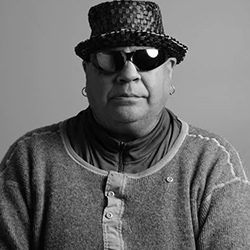If we talked about the past
we would say how strong our people
were and how they had survived
the constant rains and the great floods
and how they lived in the ground
and how they, like us, took the fish
throughout the year and how it fed
their families. And if we talk about
how they would war against other
river and island tribes who would
come upriver to try to take our people
back with them, we would say
we had great warriors who would wait
for the canoes to come to shore
where we would club them to death.
But today we do not use violence
to survive and we have become quiet
and accepting of our neighbors though
in the beginning we were almost wiped out
as sickness came with the people on ships
who wanted to trade and cheat us of our fish.
That sickness nearly wiped out all river people
but today we are still here, and we survive.
Our children have grown up with loss
and alcohol and drugs and they too fight
for their lives in a world that does not
seem to care about them but we try
to teach them the lessons from a long time
before there was anything written down.
In our ceremonies we repeat those words
and our children will also repeat those words
and so we the river people are still here.
We are all the silent warriors and we say
enough is enough and our young they pick up
the drum and they sing new songs
and they stand and shout to the world
that we are still here and will never leave
this simple island on the great river where
we still take the fish and yes, we still live
where we have been for thousands of years
and we are the ancestors of our future as
a child picks up a drum and begins to sing
a new song given to him from long ago.
Notes on the Poem
Over the next few months, our Poem of the Week will feature works from the seven collections of the newly announced 2021 Griffin Poetry Prize shortlist. This week, we’re excited to share Kwantlen, a poem by Joseph Dandurand from The East Side of It All, a collection that weaves harsh depictions of Vancouver’s Downtown Eastside’s street life to stories in which humans, nature, and land are ancestrally entwined. Dandurand writes from a time “before there was anything written down,” celebrating the survival of Indigenous legacies in which storytelling carries forth a generational wisdom indispensable to surviving this late-capitalist age. Of The East Side of It All, the 2021 Griffin poetry prize judges say: “Joseph Dandurand is a poet-storyteller. Portraying Vancouver's Downtown Eastside's prostitutes, heroin addicts, alcoholics and abused, his autobiographical poems could easily drown in the brutality and tragedy they capture – but instead they heal. These are deeply moving spiritual invocations, extricated from poisoned air by a fallen angel. Dandurand is a member of Kwantlen First Nation, located on the Fraser river near Vancouver. His origin and roots are the sources of wisdom and myths, which he masterly embeds in a drama of a dysfunctional modern society. His crystalline clear and remarkably multilayered poems are written in an unforgettable voice of someone who is telling a story in order to survive and to go on. A story of a man who has become a sasquatch, through writing.” Listen to Dandurand discuss his writing trajectory here and here.

The first time I read a few words that he had put on facebook, I commented that he was very good, and should try to get his work published. I think I suggested that his public library could get him some back issues of Sun magazine, because they published stories that were sort of in the same vein. Can you imagine how embarrassed I was when I found out who he was, and read more of his stuff? I messaged him to apologize, but haven’t heard back, lol. I don’t blame him.?